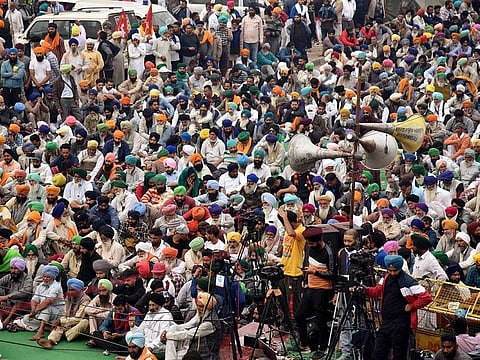In India a moment of truth for farmer protests
Do protesting farmers have genuine demands or is the prolonged roadblock a blackmail?

Farmer protests in India have reached a decisive turn. After several inconclusive rounds of talks with the government, including parleys with Union Minister of Agriculture and Farmer Welfare, Narendra Singh Tomar, and Home Minister Amit Shah, protesting farmers threatened to block the Delhi-Jaipur highway, having already “liberated” toll booths on the border.
The Delhi Police, acknowledging the seriousness of the threat, has informed travellers of the closure of various ingress points to the capital, including Singhu, Auchandi, Piau Maniyari, and Mangesh. Alternate routes and diversions, in addition to several cautionary traffic advisories have already been issued.
While Government has agreed to consider revisions to the new laws tabled a few months back, the agitating farmers have refused to accept anything short of their repeal. The farmers are determined to escalate their agitation, but the Government also does not seem to be in the mood to back down anymore.
In his Keynote speech at the 93rd Annual General Meeting of Federation of Indian Chambers of Commerce and Industry (FICCI) on December 12, Prime Minister Narendra Modi spoke out in favour of reforming various sectors of the Indian economy, including agriculture. He said that if walls were unnecessarily created between industries and sectors, it was bound to affect the economy as a whole.
Modi said that dismantling of walls between agriculture and other sectors of the economy was essential for the overall growth and development of India: “We have seen such walls in the agriculture sector and allied sectors like agriculture infrastructure, food processing, storage or cold chains. Now these walls are being dismantled and all obstacles removed.
By removing these walls and after these reforms, the farmers will get new markets, new options, the cold storage infrastructure will become modern, and they will benefit largely from technology.” He added that reforms would invite huge investments in Indian agribusiness, which would benefit small farmers. Instead of “walls,” he advocated interconnecting and supporting “bridges” between different sectors of the economy.
Committed to farmers' interests
Modi reiterated that his government supported the farmers and their interests: “Whatever the earlier policies may have been, but today’s policies are very conducive to developing a rural agro-based economy. With policy and intentions, the government is fully committed to the interests of the farmers. ” Pointing out the various benefits of the new farm policy he said, “Today, the farmers of India have the option to sell their crops outside the mandis [designated markets] as well. Today, not only the mandis are being modernised in India, the farmers are being given the option to buy and sell crops on digital platforms. The goal of all these efforts is to increase the income of the farmers and they become prosperous.”
But are the farm activists blockading Delhi listening? The fact is that like almost everything else, farm protests have now become a political agitation. They are less about the contents and merits of the three new bills than about targeting the Modi government, trying to depict it as anti-farmer, and, if possible, even to bring it to its knees.
No government can afford to ignore farmers, especially in India, where nearly 60 per cent of the population depends on agriculture for its livelihood. Over the last half-century, the miracle of Indian farming has turned the country from a food importing to agri-exporting economy. Indian farm exports are set to cross $60 billion. The scope for efficiency, improvement, and profitability in this sector are almost endless.
Right now, only government can stockpile essential commodities, such as food grains and pulses, upon which the vast majority of India’s people subsist. Government authorised agents and middleman, thus, have a stranglehold on the mandis or market where farmers must sell their produce. Moreover, government-operated godowns and storage facilities are notorious for wastage, pilferage, and even rotting of essential food supplies. Opening up the sector to competition means that vested interests are threatened.
This is especially true of Indian’s bread basket, Punjab, where farmers have been favoured since independence. Economists have pointed out how farmers from Punjab have enjoyed power and fertiliser subsidies of over Rs 100,000 per household, in addition to grants, cheaper credit, and the Minimum Support Price (MSP). The latter benefits only an estimated 6 per cent of India's farmers, most of whom are concentrated in Punjab.
When the government already has three-times the buffer stocks and surplus food grains need, forcing the government to buy their produce whether it is needed or not does not seem like a reasonable demand. As one columnist put it, it hardly matters if only rats feed off this enforced buying as long as the rich farmers get paid off. We must not forget that farm income in India is totally tax-free.
Whether or not the present agitation succeeds, one thing is clear. The time for agri-reforms in India has arrived. To keep up with the rest of the Indian economy, the farm sector must play catch up instead of burying its head in the sand.
Sign up for the Daily Briefing
Get the latest news and updates straight to your inbox







